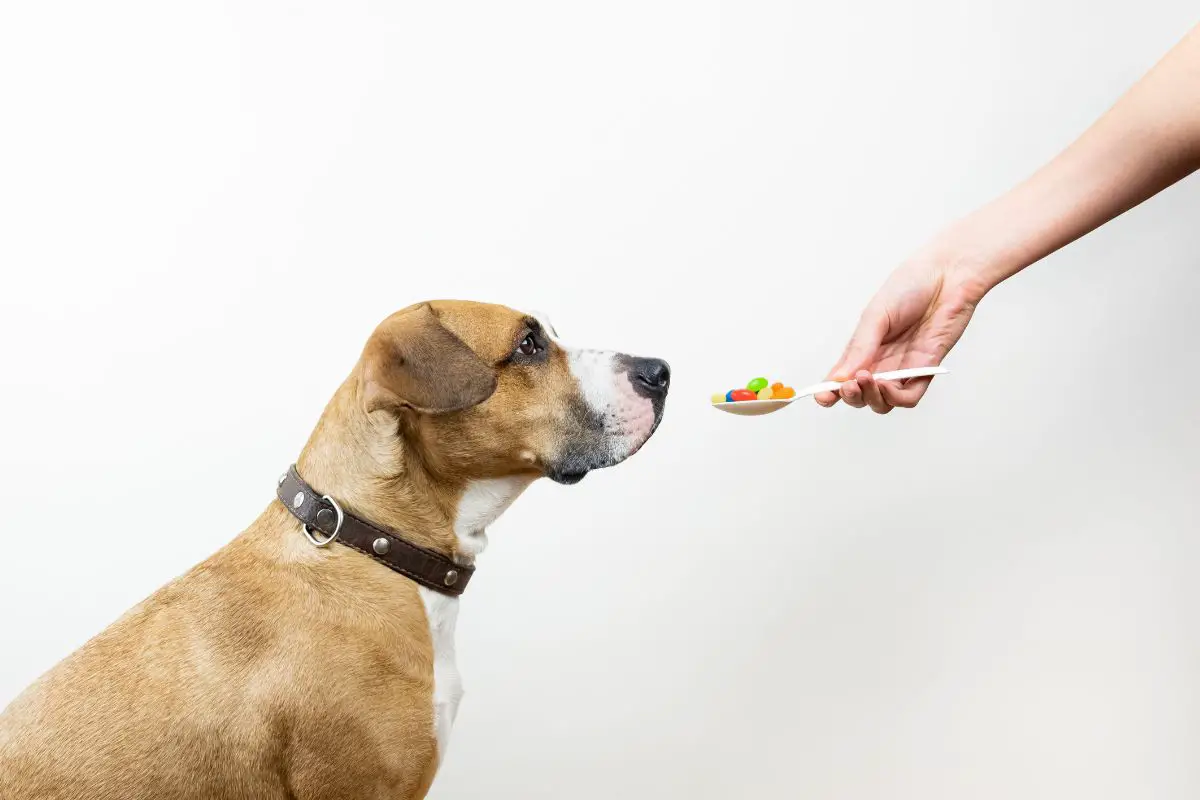A large part of owning a pet is becoming accustomed to their bathroom habits. While this may not always be the nicest of tasks, it is very helpful, and it’ll help tell you when your pet might not be feeling so well. This is certainly the case with dogs.

Though it’s thankfully rare, constipation can strikes dogs just as it can humans/ If you’re noticing that your dog is showing a decreased appetite, circling around a lot, socciting their bottom along the ground, or crying out (among other symptoms), then they may be suffering from a bad case of constipation.
A popular treatment for mild constipation in dogs, though, is pumpkin. It may not be what you expect, but this unique squash seems to be a helpful aid in treating dogs for mild cases of constipation – and even diarrhea.
However, how much pumpkin should a dog have for constipation? You don’t want to give them too much, but you’ll want to give them enough to cure their problem.
We’ve got the answers! In our handy guide below, we’ll tell you how much pumpkin you should be letting your dog eat for constipation (see also ‘Can Dogs Eat Rice Cakes?‘). On top of that, we’ve got tips on what to avoid, and much more. Read on!
How Much Pumpkin Should A Dog Have For Constipation?
Let’s begin by answering the key question. The answer is that it all depends on what type of dog you have, and what size they are.
Different amounts of pumpkin work best for different cases, so you need to identify what will work best for your pooch.
If you can’t properly determine how much pumpkin your dog should be having, of course consult a professional vet, who will be able to cater it perfectly to your furry friend.
Smaller Dogs
If you’ve got a smaller dog, then you may be wanting to give smaller teaspoons of pumpkin to them.
Half a teaspoon will usually help their constipation, but you can give them a full teaspoon if they’re not getting better. In rare cases, 2 teaspoons might be needed.
Medium Breed Dogs
If you’ve got a medium breed dog, that is to say a dog that weighs between 20 and 60 pounds, then you’ll want a different amount of pumpkin.
1 teaspoon of pumpkin for every 10 pounds of their body weight could do the trick, but you might want to check with your vet.
Large Dogs
If you’ve got a large dog, you’ll want to give them 1 or 2 teaspoons of pumpkin. See if it starts to help cure their constipation, then give more if necessary.
Hard Stools
If your dog has been straining while they try to defecate, and you want to break their hard stools up into something that is much softer, then you’ll want a different amount of pumpkin.
In these cases, where a dog might have just had a certain surgery, you’ll want to give a large straining dog as many as 4 tablespoons of pumpkin.
This is quite a lot, so give it to them one at a time and see if any changes come before giving them another spoonful.
Sensitive Stomachs
If your furry friend has a sensitive stomach, then you’ll want to give them small doses of pumpkin. Keep the pumpkin to a minimum and see if their constipation begins to ease.
Why Does Pumpkin Help Dogs With Constipation?
Since pumpkin may not have been your first guess for constipation cleanser, you might be wondering how this fall-favorite squash is such a good food for helping dogs with constipation (and diarrhea) issues.
Well, it’s all to do with the contents of a pumpkin. To go a bit scientific, pumpkin is a food that has large amounts of fiber in it.
Fiber is a very well known essential nutrient for helping increase the frequency of people’s stools, and this is no different in dogs.
Soluble and insoluble fiber helps to increase the softness of stool, as well as its weight, and this helps to make it move more quickly through the digestive tract.
Fiber also offers intestinal help for your dog, too, as if that wasn’t enough! It helps to stimulate good bacteria to grow inside your pooch’s intestines, helping to stop the growth of bad bacterias at the same time.
On top of that, pumpkins also have large amounts of water. These help to soften a dog’s stool up too, which makes it much easier for the stool to pass, acting like a laxative. That way, they shouldn’t be constipated.

Vitamins And Minerals
In addition to those benefits, pumpkin is also a healthy food to have in any diet, thanks to its healthy contents. It contains vitamins A, C, and E, which will prove helpful to your dog, as well as decent amounts of potassium.
Potassium helps to give your dog energy, because it helps the electrical charges in the heart, muscles, and nerves.
How Does It Help With Diarrhea?
You might be wondering how pumpkin can help both constipation and diarrhea in dogs, when they both seem like such different things to suffer.
Well, it all goes back to those soluble and insoluble fibers that we mentioned earlier.
The insoluble fiber is what aids the constipation, because it uses moisture to make the dog’s stool softer.
On the other hand, the soluble fibers soak up the excess of moisture in the dog’s gastrointestinal tract, which helps to fix their diarrhea. This also slows down the tract.
What Do You Need To Be Careful With When Giving Your Dog Pumpkin?
However, as handy as pumpkin can be in clearing up your dog’s constipation, you need to be very careful and considerate when giving out the doses.
For one thing, if you give your dog too much pumpkin, it could give your dog digestive stress. Given that your dog is already struggling, an extra issue is not going to sit well with them.
On top of that, the excess amounts can stop their body properly absorbing some key nutrients.
Speaking of nutrients, too many of the vitamins A and E can have a negative effect on your dog, because they’re fat soluble. This means that they are stored in the body’s fatty tissues.
You should also not serve your dog canned pumpkin that has artificial additives added into it. Things like sugar, spices, and salts can be found in some canned pumpkin, and this will prove awful for your dog’s stomach.
Additionally, your dog shouldn’t be eating the shell of a fresh pumpkin, or its leaves and stems.
The shell can be covered in pesticides or other bad things, which would harm your dog, and the leaves and stems can irritate your dog’s mouth with their pointed hairs.
You should also DEFINITELY NOT give your dog any canned pumpkin pie mix. This might have xylitol in it, a chemical compound that is toxic to pets.
Putting Pumpkin In Your Dog’s Meals
Putting pumpkin into your dog’s normal meals can be a good way to heal their constipation or diarrhea, as well as give them some health benefits.
However, you must keep the amounts moderate, never giving them an excess of pumpkin. Its calorie count is quite low, so it shouldn’t unbalance meals.
You SHOULDN’T include it in your dog’s treats or special sauces, especially because a constipated dog will need normal, simple meals. Stick to including it in their daily food only.
But where do you get the pumpkin in the first place? Well, canned pumpkin (plain, not special varieties) is the best way to get it for your dog.
This is because the canned version actually has even more nutrients and fiber in it than a fresh pumpkin would – which is surprising!
Keeping Your Dog Hydrated
When your dog is constipated, you need to ensure that they’re absolutely keeping hydrated every day. If they become dehydrated, it will worsen their problem.
Worse still, lots of fiber can dehydrate a dog (just like with humans), so you need to doubly make sure they’re getting enough water, because the pumpkin is high in fiber.
If your dog is hesitant to the water you’re giving them, try giving it in a flowing, fountain-type way. It’s found that some dogs like their water to be running, rather than motionless. This won’t always be the case, though.
More Top Tips
- When using fresh pumpkin, make sure to get rid of all the insides and seeds. This is because they can be harmful to your dog, so be very careful.
- Always double check with your vet as to how much pumpkin you should be giving your specific job.
Final Thoughts
Pumpkins can not only help a dog with constipation, but diarrhea too. Always ensure that you only give your dog moderate amounts of it, though, largely based on their size and situation.
Consult your vet for extra guidance, and never give your dog too much pumpkin – it can be bad for them.
- Are Antlers Safe For Dogs? - January 14, 2024
- Can Dogs Eat Honey Nut Cheerios? - December 23, 2023
- Natural Deworming Remedies for Your Dog - December 18, 2023









